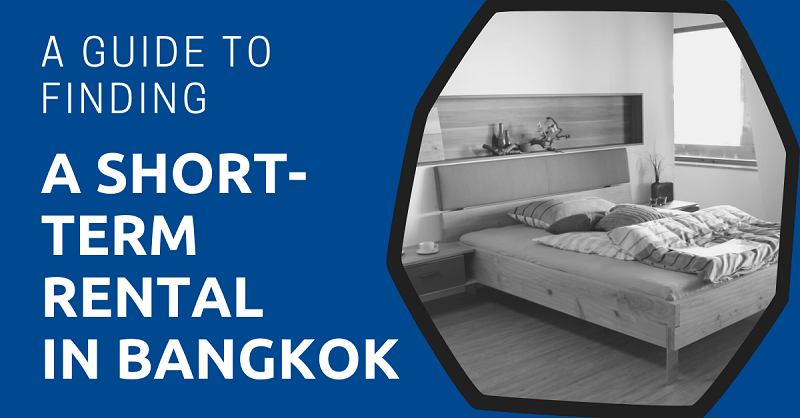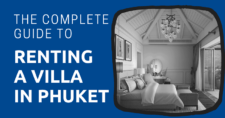
If there’s one thing Bangkok has plenty of, it’s accommodations.
The city has been going through a boom in recent years. New condo projects are being built somewhere in the city on a daily basis. And with tourism playing such a major role in the Thai economy, there is no shortage of hotels either.
This means that finding a short-term stay in Bangkok is quite easy — if you know where to look, and what to look out for.
By the end of this guide, you’ll find out the benefits of renting short-term in Bangkok, as well as some of the issues you may encounter. You’ll also discover which websites to look on and even come across some of the lesser known, yet effective, ways of finding short-term stays in the city.
"*" indicates required fields
Disclaimer: This article may include links to products or services offered by ExpatDen’s partners, which give us commissions when you click on them. Although this may influence how they appear in the text, we only recommend solutions that we would use in your situation. Read more in our Advertising Disclosure.
Contents
- Key Takeaways
- Why Rent a Short-Term Apartment in Bangkok?
- What to Consider When Renting a Short-Term Apartment in Bangkok
- Short-Term Rentals in Bangkok
- Popular Locations for Short-Term Rentals in Bangkok
- Most Affordable Time to Rent a Short-Stay in Bangkok
- Can I Have Guests at a Short-Term Rental?
- Now, on to You
Key Takeaways
- Bangkok offers a variety of locations for short-term rentals to suit all tastes
- Short-term rentals are cheaper than paying for hotels by the day
- You have many options when searching for short-term rentals, including Airbnb and other sites
- July to October is the cheapest time to rent a short-term stay in Bangkok
- Always make sure the property you’re interested in renting allows short-term stays
Why Rent a Short-Term Apartment in Bangkok?
Bangkok has plenty to offer in terms of accommodation, from basic cheap-and-cheerful B&Bs to luxury 5-star hotels and villas. You’re pretty well-covered if you’re staying in the city for a quick weekend break or settling in for a year.
But sometimes, neither of those is a good option. Maybe you’re only working for a few months in the city before moving on elsewhere, or maybe you’re traveling for a month or so and would like a base-of-operations in the city.
This is where short-term rentals in Bangkok come in.
A short-term rental is a property, normally an apartment, you rent for a month or two at a time, often with the option to renew for another month at the end or check out and carry on with your travels, rather than being locked-in to a year-long contract as you might with a more traditional property.
Short-Term Rental Vs. Hotel
There are a number of benefits to staying in a short-term rental rather than just paying day-by-day at a hotel. Below are some of those benefits.
Prices
Staying in a standard tourist-oriented hotel can be good value-for-money over the course of a few days but more expensive when stretched out over a month.
Space
Hotels offer advantages such as access to common facilities and daily room-cleaning. But they provide less living space than a condo unless you’re willing to pay through the nose for it.
Renting an apartment, or even a house, short-term provides you with more space for less.
Privacy
Renting your own home or a condo gives you more privacy than a hotel. There, you’re just another guest. If you’re willing to spend a little more cash, it’s even possible to find short-term rentals with private pools or gyms.
What to Consider When Renting a Short-Term Apartment in Bangkok
One big issue with finding short-term rentals in Bangkok is the complex set of laws surrounding rental accommodations in Thailand.
Any property owners who want to rent out their spaces for less than 30 days must register their property as a hotel. Instead, property owners choose to rent their rooms out for a minimum of 30 days through apps like Airbnb.
This is only legal in buildings that permit it.
But this practice can still bring trouble to you and the owner. Most residential condos don’t allow owners to rent out their units through Airbnb. So if they — or you — get caught, you could be kicked out of a unit at any time and have nowhere to go.
What does all this mean to you? Make sure the property of the short-term rental you’re about to pay for allows short-term guests. Ask the unit owner. Look at reviews. Do your research.
Short-Term Rentals in Bangkok
Let’s take a look at your options for short-term rental.
Airbnb
Airbnb is a good first port-of-call for short-term rentals. There are many options available, from hotels to penthouses with different price ranges and areas throughout Bangkok.
The only thing you should be aware of is that you have to rent a unit for at least 30 days. Otherwise, as stated above, the properties advertised may not necessarily be legal.
If, for whatever reason, the law catches you staying in one of these properties, you won’t be punished — the punishment will land entirely on the landowner.
However, it could put a big downer on your trip to be forced out of your rental, and you’re unlikely to get the money back, so it’s up to you if you want to take the risk.
- Pros: broad range of options
- Cons: a minimum rental duration should be at least 30 days
Online
There are a few websites advertising short-term rentals in Bangkok, including Renthub and RentBangkokCondos.
Another option is to check the more traditional hotel sites such as Agoda Homes or even Booking.com. You’ll be given plenty of options, and unlike apartment rental sites like Hipflat, all the legal stuff such as rental agreements and security deposits will be taken care of.
However, expect to pay more per month for short-term rentals found on these sites than you would with a standard 12-month lease.
- Pros: broad range of options
- Cons: listings can be misleading
Serviced Apartments
Serviced apartments are a popular form of accommodation in Bangkok, and you can find them in just about everywhere in the city.
Existing somewhere between a hotel and a traditional apartment, serviced apartments in Bangkok differ from condominiums in that each unit in a building is owned by one entity to whom you pay rent, rather than each unit being owned privately.
Serviced apartments vary in quality, from basic one-bedroom rooms in buildings to luxury resort-style complexes with swimming pools and restaurants.
As you’re renting directly from the building and, therefore, cutting out the middle-person, serviced apartments tend to be cheaper to rent.
These rooms are also usually fully furnished. And because you’re renting directly from the building manager, they take care of any maintenance the room requires rather than you having to seek a third-party contractor.
A good place online to seek out serviced apartments is 9apartment. In any case, serviced apartments are common enough that, like hotels, it’s easy enough to pick out an area of Bangkok you want to live in and start wandering round.
- Pros: rent is often cheaper than condos; the privacy of your own space with the facilities of a hotel
- Cons: utilities can be expensive
Lease Takeovers
An increasingly common method for finding short-term rental homes or condominiums is to take over someone else’s lease period.
As stated above, leases tend to span a period of at least six — and more commonly, 12 — months, and with expats in Thailand notoriously transient, there are frequently people out there looking for a tenant to occupy their rental property for the rest of the contract’s duration when they decide to move on.
On Facebook pages like Bangkok Expats or Bangkok Take Over My Lease, you can find plenty of ads from expats seeking new tenants. This can be a convenient way to find a condo to rent short-term, which would normally be off limits due to the lease length.
However, do be careful — lease takeovers are ultimately at the discretion of the landlord, and there are many landlords out there who are less-than-happy at the added paperwork this can generate.
Make sure that the previous tenant has cleared everything with the landlord beforehand, and also that they’re up-to-date on utility bills. You don’t want to be saddled with a huge electricity bill the second you move in.
- Pros: allows you to rent out properties, which would normally be off-limits (condos, etc.)
- Cons: you’re relying on the goodwill of strangers; make sure everything’s in order before signing on the dotted — particularly with regards to the landlord
Room-Sharing
The low cost of living in Bangkok means there are far fewer expats sharing accommodation as you would find in most major Western cities. You’ll find that the majority stay alone or with their partner or family.
But there are a number of benefits to sharing accommodation, particularly for those seeking short-term rentals.
First, by pooling your rental money, you can land a much larger and more luxurious property than you would by a villa with a private pool or a spacious three-storey home in the Old City.
Second, you’re much less tied down to a long-term lease, as the landlord knows there are other tenants to fall back on. And last, there’s the social aspect. For many young expats moving to a new country, it can be difficult to meet people. Having roommates is a great way to make new friends quickly.
Sites like Erasmu or the Facebook page Roommates/Apartments for Rent Bangkok are a good place to start looking for shared rooms. As always, take basic precautions.
- Pros: social life; access to much larger properties
- Cons: not such a good choice for introverts
Hotels
The crisis in the tourism industry over the last few years has forced many hotels to diversify their businesses beyond the traditional short-stay, bed-and-breakfast model.
In some cases, this has included opening up their hotels for longer-staying guests, often on a discounted monthly basis.
Hotels that offer these services do so on a fairly casual monthly basis, meaning you don’t need to feel as tied-down as you might be when renting a condo. And while prices may be a little higher at times, you also get the advantages that come with hotels, including regular room-cleaning, laundry services, and so on.
If you’re already in Bangkok and happen upon a hotel you like, it may be worth inquiring if they offer monthly rentals, as this service is not always advertised.
Simply find a part of town you’d like to live in, bring up Google Maps, and start asking around — you may be surprised at what you find out there.
- Pros: all the benefits of staying in a hotel at a lower cost
- Cons: not quite as private as a condo or villa you rent for yourself
Popular Locations for Short-Term Rentals in Bangkok
Bangkok is vast, and just as vast is the number of locations where you can find a short-term rental in the city.
Popular locations include those along and branching off Sukhumvit Road and Silom Road. In these areas, you’ll find a mix of older and newer properties.
Then you have the Old City and Chinatown, both of which offer historical and unique short-term stays, especially if you’re interested in staying in a traditional shophouse.
Most Affordable Time to Rent a Short-Stay in Bangkok
Although Thailand is a popular destination for visitors all year round, the country does have a high and low season.
If you want to get the best deal on a short-term rental in Bangkok, you should come between July and October — Thailand’s rainy season. Although it rains often during this time, it only does so for a few hours at a time, at most, and usually clears up once the sun hits the pavement.
Avoid the high season if you’re looking for good deals on short-term stays in Bangkok. High season typically lasts from November to June.
Can I Have Guests at a Short-Term Rental?
This all depends on the property managers of your short-term rental in Bangkok. If you’re renting a condo or apartment, you can have guests as you please.
But some hotels in Bangkok may not allow guests, especially if you booked the room as only one guest. For those that do allow guests, your guest may have to leave their ID or passport at the front desk while they’re visiting you.
Now, on to You
While finding short-term rentals in Bangkok can be a little harder than finding a traditional long-term rental, you do have options if you’re willing to look, from room-shares to serviced apartments to hotels.
There will no doubt be something out there to suit your needs and budget. However, make sure you do your homework before settling on a place, and be aware of any potential legal difficulties.







